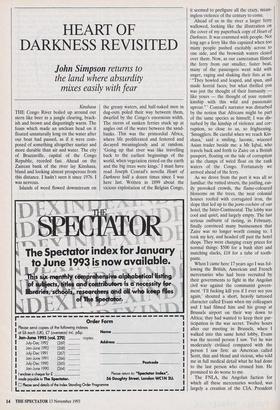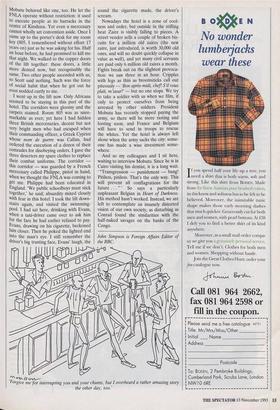HEART OF DARKNESS REVISITED
John Simpson returns to
the land where absurdity mixes easily with fear
Kinshasa THE Congo River boiled up around our stern like beer in a jungle clearing, brack- ish and brown and disgustingly warm. The foam which made an unclean head on it floated unnaturally long on the water after our boat had passed, as if it were com- posed of something altogether nastier and more durable than air and water. The city of Brazzaville, capital of the Congo Republic, receded fast. Ahead on the Zairean bank of the river lay Kinshasa, bland and looking almost prosperous from this distance. I hadn't seen it since 1976. I was nervous.
Islands of weed flowed downstream on
the greasy waters, and half-naked men in dug-outs poled their way between them, dwarfed by the Congo's enormous width. The sterns of sunken ferries stuck up at angles out of the water between the sand- banks. This was the primordial Africa, where life proliferated and festered and decayed meaninglessly and at random. 'Going up that river was like travelling back to the earliest beginnings of the world, when vegetation rioted on the earth and the big trees were kings.' I must have read Joseph Conrad's novella Heart of Darkness half a dozen times since I was here last. Written in 1899 about the vicious exploitation of the Belgian Congo,
it seemed to prefigure all the crazy, mean- ingless violence of the century to come.
Ahead of us in the river a larger ferry wallowed, looking like the illustration on the cover of my paperback copy of Heart of Darkness. It was crammed with people. Not long ago a ferry like this capsized when too many people pushed excitably across to one side, and the brownish waters closed over them. Now, as our cameraman filmed the ferry from our smaller, faster boat, many of the passengers went wild with anger, raging and shaking their fists at us. "They howled and leaped, and spun, and made horrid faces; but what thrilled you was just the thought of their humanity — like yours — the thought of your remote kinship with this wild and passionate uproar."' Conrad's narrator was disturbed by the notion that Africans might be part of the same species as himself; I was dis- turbed by the kinship of violence and cor- ruption, so close to us, so frightening. 'Smugglers. Be careful when we reach Kin- shasa,' said a smiling, laconic, wizened Asian trader beside me: a Mr Iqbal, who travels back and forth to Zaire on a British passport, floating on the tide of corruption as the clumps of weed float on the rank waters of the Congo. Fortunately we arrived ahead of the ferry.
As we drove from the port it was all so familiar: the rutted streets, the jostling, eas- ily provoked crowds, the flame-coloured blossoms on the trees, the neat colonial houses roofed with corrugated iron, the slope that led up to the porte-cochere of our hotel, the Inter-Continental. The lobby was cool and quiet, and largely empty. The last serious outburst of rioting, in February, finally convinced many businessmen that Zaire was no longer worth coming to. I took my key, and headed off past the hotel shops. They were charging crazy prices for normal things: $500 for a bush shirt and matching slacks, £18 for a tube of tooth- paste.
When I came here 17 years ago I was fol- lowing the British, American and French mercenaries who had been recruited by their governments to fight in the Angolan civil war against the communist govern- ment. 'I'll fucking kill you if lever see you again,' shouted a short, heavily tattooed character called Evans when my colleagues and I had filmed him and his group at Brussels airport on their way down to Africa; they had wanted to keep their par- ticipation in the war secret. Twelve hours after our meeting in Brussels, when I walked into this same hotel lobby, Evans was the second person I saw. Yet he was moderately civilised compared with the person I saw first: an American called Scott, thin and blond and vicious, who told me in full medical detail what he had done to the last person who crossed him. He promised to do worse to me.
The FNLA, the Angolan faction for which all these mercenaries worked, was largely a creation of the CIA. President Mobutu behaved like one, too. He let the FNLA operate without restriction: it used to execute people at its barracks in the centre of Kinshasa. Yet even a mercenary cannot wholly set convention aside. Once I came up to the porter's desk for my room key (805, I remembered without effort 17 Years on) just as he was asking for his. Half an hour before, he had promised to kill me that night. We walked to the copper doors of the lift together: these doors, a little more dented now, but recognisably the same. Two other people ascended with us, so Scott said nothing. Such was the force of social habit that when he got out he even nodded curtly to me.
I went up in the lift now. Only Africans seemed to be staying in this part of the hotel. The corridors were gloomy and the carpets stained. Room 805 was as unre- markable as ever; yet here I had hidden three British mercenaries, decent but not very bright men who had escaped when their commanding officer, a Greek Cypriot Whose nom de guerre was Callan, had ordered the execution of a dozen of their Comrades for disobeying orders. I gave the three deserters my spare clothes to replace their combat uniforms. The corridor this corridor — was guarded by a French mercenary called Philippe, pistol in hand, when we thought the FNLA was coming to get me. Philippe had been educated in England. 'We public schoolboys must stick together,' he said; absurdity mixed closely With fear in this hotel. I took the lift down- stairs again, and visited the swimming- Pool. I had sat here, drinking with Evans, When a taxi-driver came over to ask him for the fare he had earlier refused to pay. Evans, drawing on his cigarette, beckoned him closer. Then he poked the lighted end into the man's eye. I still remember the driver's big trusting face, Evans' laugh, the
sound the cigarette made, the driver's scream.
Nowadays the hotel is a zone of cool- ness and order, but outside in the stifling heat Zaire is visibly falling to pieces. A street vendor sells a couple of broken bis- cuits for a million old zaires (the new zaire, just introduced, is worth 30,000 old ones, and will no doubt quickly collapse in value as well), and yet many civil servants are paid only 6 million old zaires a month. Fights break out on the slightest provoca- tion: we saw three in an hour. Cripples with legs as thin as broomsticks call out piteously — 'Bon apres-midi, chef! SW vous plait, m'sieurf — but no one stops. We try to take a soldier with us when we film, if only to protect ourselves from being arrested by other soldiers. President Mobutu has recently stopped paying the army, so there will be more rioting and looting soon, and France and Belgium will have to send in troops to rescue the whites. Yet the hotel is always left alone when the army sacks the city: some- one has made a wise investment some- where.
And so my colleagues and I sit here, waiting to interview Mobutu. Since he is in Cairo visiting his dentist, it is a long wait. "Transgression — punishment — bang! Pitiless, pitiless. That's the only way. This will prevent all conflagrations for the future. . " ' So says a particularly unpleasant Belgian in Heart of Darkness. His method hasn't worked. Instead, we are left to contemplate an insanely distorted vision of our own society, as disturbing as Conrad found the similarities with the half-naked savages on the banks of the Congo.
John Simpson is Foreign Affairs Editor of the BBC.
Forgive me for interrupting you and your chums, but I overheard a rather amusing story the other day, too.'



























































 Previous page
Previous page